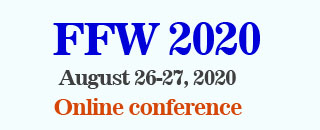
The 8th International Conference on Fracture Fatigue and Wear (FFW 2020)
August 26-27, 2020, Online conference

 | Professor David Nowell Mechanical Engineering, Imperial College London |
|
Professor David Nowell is Professor of Machine Dynamics at Imperial College London. He has been involved in research in solid mechanics and tribology for over 30 years and he has developed a particular interest in fretting fatigue. His recent research has focused on the role of frictional interfaces in providing damping in complex engineering systems. Professor Nowell is a Fellow and a Trustee of the Institution of Mechanical Engineers (I.Mech.E.). He is also a Fellow of the Institute of Materials Minerals and Mining (IoM3). He is editor of the Journal of Strain Analysis for Engineering Design. Speech Title: Are interfaces a good thing? Fretting fatigue, wear, and frictional damping Abstract: Engineering systems usually consist of many individual components with mechanical connections between them. These connections frequently take the form of frictional interfaces. Examples include blade roots, splines, flanges and other bolted connections. Any system will have a number of natural frequencies and if mechanical forcing occurs at a similar frequency, significant vibration amplitudes will result. Hence there is frequently a requirement to provide system damping. Frictional interfaces provide a convenient form of damping, either fortuitously or introduced deliberately into the design. The considerations above suggest that interfaces in a system are a good thing, even if their contribution to system behaviour is not always predictable and/or repeatable. On the other hand, there are many examples of premature failure from interfaces by the processes of fretting fatigue or fretting wear. Significant research effort has been deployed over many years to address these failure modes. Often the objective is to reduce or eliminate the effect of fretting. Whilst this is an entirely laudable aim, it can often fail to recognise that the joint behaviour has a significant effect on overall system dynamics. Hence what is needed in real engineering design is a holistic approach, which considers the driving force, the system response and the role of the interface, recognising that eliminating fretting is not always the optimum solution. The keynote will address this issue and outline a framework for the design of more effective joints between components. |
|